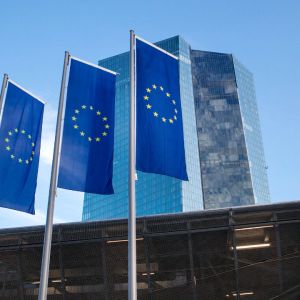Centeno insists the ECB must release more money into eurozone economy
4 min read
The ECB needs to drop the brakes and hit the gas again. Mario Centeno, a Governing Council member at the European Central Bank, told La Stampa Sunday that the eurozone economy is still too weak to sustain current interest rates and called for “further stimulus.” Centeno said, “The level of rates must be compatible with an economy that generates stable inflation at 2%,” but in his view, that economy “does not yet exist in the euro area.” Centeno pointed to both supply and demand as being too fragile to bring inflation back to the ECB’s target without more help. “Today GDP is below potential, which indicates that the economy is not in equilibrium,” he said, adding that if the neutral rate stands at 2% but output is still under, then interest rates should fall below that level to close the gap. Despite eight rate cuts over the past year, Centeno is clearly not convinced the job is done. Centeno’s term ends, but message targets July ECB meeting Centeno’s comments come just weeks before the next ECB policy decision on July 24, where a pause is widely expected. But by that date, he may no longer even be in the room. His term as head of Portugal’s central bank ends earlier in July, and the government hasn’t confirmed whether he’ll be reappointed. He took over in 2020, after serving as finance minister under a Socialist-led government that was later voted out. In Portugal, central bank governors are named by the government and serve five-year terms. The ECB’s easing campaign started last June, when euro-area inflation had just come off its 10% high from 2022, driven by energy shocks linked to Russia’s war in Ukraine. Now, with inflation closer to the 2% target, officials are signaling they’ll hold off on more cuts, at least for now, to see how US trade tariffs and energy prices play out. That’s the political and economic backdrop Centeno’s warning is landing into. Lagarde visits Kyiv as ECB eyes deeper EU trade ties While Centeno presses for action on interest rates, Christine Lagarde, president of the ECB, focused her attention on trade. Speaking during a surprise visit to Kyiv on Friday, Lagarde said boosting regional trade could protect Europe from the fallout of global fragmentation. “By deepening economic ties, more closely linking neighboring economies, we can reduce our exposure to external shocks,” she said. She pointed out that most eurozone exports already go to nearby countries like the UK, Switzerland, and Norway. Her trip wasn’t supposed to be in person, but she showed up anyway. Lagarde has been one of the most visible EU officials backing Ukraine since the war began, calling the invasion “unjustified” and a defining moment for the region. “Ukraine stands at a pivotal moment, facing the hardships of war, the challenge of reconstruction and the opportunity of deeper regional integration,” she said. She argued that stronger internal ties could help Europe bounce back from external economic shocks, including ones caused by armed conflict. The war’s financial fallout hit hard. Eurozone inflation spiked past 10% in 2022, mostly due to energy costs. That’s what triggered the current rate-cutting campaign from the ECB. But with inflation now under control, officials are trying to figure out how much more cutting is needed, or if they should stop here. In that debate, Francois Villeroy de Galhau, another Governing Council member and head of the Bank of France — weighed in with a warning: the ECB must stay ready to act again if needed. Speaking at the European University Institute in Florence, he said, “Barring a major exogenous shock, including possible new military developments in the Middle East, if monetary policy were to move in the next six months, it would be more in the direction of accommodation.” Villeroy emphasized that the ECB is in a strong position now, with both the deposit rate and inflation around 2%, but added that “This return to ‘2 and 2’ should not give way to complacency and passivity.” For him, policy must stay flexible. He said the bank should be “agile,” but not “unpredictable or indecisive,” and should keep its actions “readable” — meaning easy for the market to understand. He also flagged a few risks the bank is watching. One is energy prices, which could rise again depending on how global conflicts evolve. Another is the euro’s recent strength against the dollar , which Villeroy said has a “clear disinflationary effect.” If that continues, it might ease pressure on inflation but also hurt exports. Either way, it’s on their radar. “We need to remain alert and agile, in all our next meetings,” Villeroy said. Cryptopolitan Academy: Tired of market swings? Learn how DeFi can help you build steady passive income. Register Now

Source: Cryptopolitan



